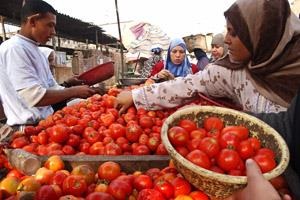
15 May 2012, Rome - Measures to improve regional food security by cutting food losses and waste and by mitigating and adapting to climate change will be considered by FAO's Regional Conference for the Near East.
Land and water constraints severely limit the potential for increased food production to feed a Near Eastern population set to grow from 380 million to 520 million in 2030. In addition to improving land and water management, lower food losses and waste would help provide the extra food without putting additional pressure on limited land and water resources.
Annual losses in grains are estimated at more than 16 million tonnes across the region. Some 15 percent of vegetables and legumes and more than 30 percent of perishable foods such as fruit, vegetables, dairy products, meat and fish are also wasted annually in the region.
The Conference, from 14 to 18 May at FAO headquarters, is also due to discuss the creation of a Regional Trust Fund for agricultural development to supplement existing international funding.
Poor facilities
Reasons for food losses and waste include poor storage facilities and limited cold storage. As for animal-source foods, losses during handling, storage, processing, packing, distribution and consumption are significantly higher than losses during production.
At between 25 and 50 percent, losses in fish and seafood are the highest of any animal-source foods, with more than two thirds of losses incurred during processing, packaging and distribution.
Much of the problem stems from the limited number of wholesale, supermarket and retail facilities providing suitable storage and sales conditions for food products. Wholesale and retail markets in the region are often small, crowded, unsanitary and lacking in cooling equipment.
Another issue is the lack of paved roads suitable for large vehicles to connect production areas with ports or city centres, as well as a shortage of power and water infrastructure.
Recommendations before the Conference focus on increased investment by the private and public sector in facilities and infrastructure, and effective collaboration between academia, industry, government and business.
Climate change
Advancing climate change adds extra urgency for solutions to the food waste problem as it is placing additional pressure on the Region's land and water resources. The possibility of reduced rainfall and a temperature increase of up to 4 degrees Celsius threaten the sustainability of agricultural systems and of forest and rangeland resources in the region.
The use and management of natural resources, especially land and water needs to be enormously improved.
The Near East Region is one of the most water-scarce regions in the world. As water scarcity in the region grows, the quality of available water deteriorates: pollution of groundwater and degradation of water bodies and water-related ecosystems increase.
To reduce the impact of water scarcity, both in terms of quality and quantity, improved water management therefore needs to address: i) the scarcity of physical resources, ii) the lack of capacity within water management organizations, iii) the lack of accountability for water waste.
Livestock, representing between 30 and 50 percent of agricultural output in the region, is particularly at risk from water scarcity. The fisheries sector is also vulnerable due to an anticipated increase in sea levels.
Recommended actions for adaptation in the fisheries sector include development of aquaculture and integrated agriculture/aquaculture. On livestock, suggested adaptive measures include increased use of mixed crop-livestock farming systems.
On forestry and range management, recommendations include restoration of degraded forests, afforestation and reforestation, use of drought-tolerant species and rangeland rehabilitation. Improved management through reduction of excessive livestock numbers and overgrazing, illegal logging and overharvesting of fuel wood are also proposed.